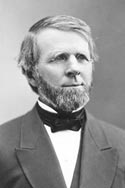November 1854: Oren Cheney takes a step toward a new college
A series of baby steps, rather than a single “shazam!” moment, led to the founding of Bates College. One step was taken on Nov. 22, 1854, in Topsham, Maine. At a Free Will Baptist educational convention, Oren Cheney went public with his vision for a new Maine school, exhorting fellow church leaders to seek from the Maine Legislature money and a charter for a new “literary institution.”
In scale, the school would be “somewhere between an academy and a college,” Cheney wrote before the convention. The only Free Will school in Maine, a seminary at Parsonsfield where Cheney had once served as principal, had burned in September, thus the need for a new Free Will school, Cheney wrote, “haunts us sleeping and waking…. Let us arise and build, brethren; at any rate, let us try — this can do no harm — not until we have tried can we submit to a failure.”
And as he rallied his cause in the pages of The Morning Star, a Free Will Baptist newspaper for which he served as an editor, Cheney, with some prescience, even set the stage for what would become, years later, a lively three-school rivalry. Cheney compared the state’s land-and-cash support for a Congregationalist college (Bowdoin) and a Calvinist Baptist one (Colby, then known as Waterville College) with what the Free Will Baptists had gotten from the state: “a trifle.” (At that time in Maine, the population of Free Will Baptists was about two-thirds the total of Congregationalists and about equal to the number of Calvinist Baptists, according to Cheney’s estimates.)
The educational convention agreed with Cheney, resolving to “concentrate…efforts in the establishment of a literary institution of such a character as shall meet the wants…of the denomination throughout the state.” Four months later, in March 1855, the Legislature granted a charter for the Maine State Seminary, to be founded by Free Will Baptists but open to all men and women — the forerunner of Bates College.
